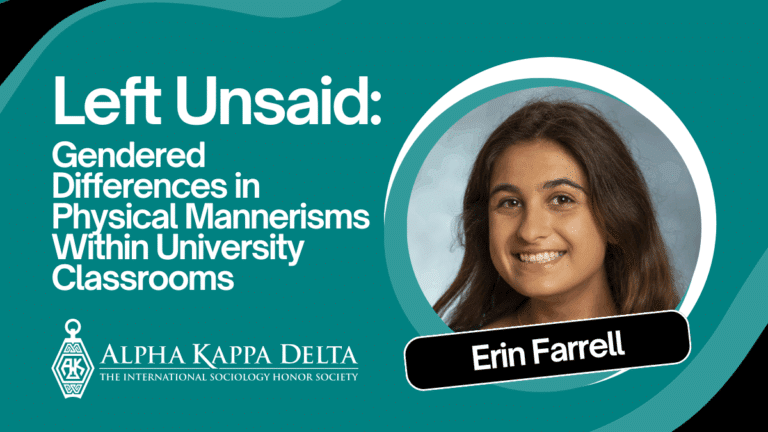
Editorial Note:
This blog feature was created by the Alpha Kappa Delta (AKD) Media Editor, Stephanie Wilson, in celebration of the second place winner in AKD’s 2025 undergraduate student paper competition, Erin Farrell.
Each year AKD sponsors an undergraduate student paper competition. Winners are eligible to win cash prizes and travel money to attend the American Sociological Association annual conference. The third place winner received $250 and up to $1,000 in travel expenses to the 2025 annual meeting of the American Sociological Association.
Continue reading to learn more about Erin Farrell’s winning paper!
Meet Erin Farrell
 Erin Farrell recently graduated from Georgetown University with a bachelor’s in Sociology and has since started a Master’s in Education program and a career in teaching. Her paper titled “Left Unsaid: Gendered Differences in Physical Mannerisms Within University Classrooms“ earned her a second place prize in our 2025 Undergraduate Student Paper Competition as well as the Georgetown Sociology Hall Thesis award.
Erin Farrell recently graduated from Georgetown University with a bachelor’s in Sociology and has since started a Master’s in Education program and a career in teaching. Her paper titled “Left Unsaid: Gendered Differences in Physical Mannerisms Within University Classrooms“ earned her a second place prize in our 2025 Undergraduate Student Paper Competition as well as the Georgetown Sociology Hall Thesis award.
To learn more about Erin and her research, we reached out for a brief interview. Continue reading below to learn more about Erin, her award-winning paper, and her experiences as a sociology student! You can also connect with Erin on Instagram.
Can you briefly summarize your award-winning paper?
Educational theorists have identified a disparity between male and female professors’ course evaluations based on gender biases in students’ perception of instructors’ qualifications and expertise. Research also suggests that nonverbal communication is critical for effective instruction. This study searches for an intersection of these findings, hypothesizing that differences in male and female physical mannerisms could be one factor that explains the underestimation of female professors. 40+ hours of ethnographic observations of undergraduate lectures analyzed under symbolic interactionist theory identified that gendered differences in professors’ physical mannerisms were present.
Women exhibited more presentations of performativity, while men demonstrated nonchalance. Gendered differences in “ease” may have to do with gendered differences in self-assuredness. Female professors seemed concerned with convincing students of their expertise, rather than assuming it was naturally granted. Understanding the relationship between gender and nonverbal communication may provide clues to address the gender gap in higher education.
What motivated you to write on the topic of your paper?
After my graduation from college, I entered a Master’s program in Education and started my career as a teacher. Knowing that I wanted to be a teacher, especially as a young woman, the intersection of and pedagogy and identity drew me in. The ethnographic work I did for my thesis changed the way that I experienced being a student and inspired a careful awareness of myself as a social actor while teaching. I will never be able to unsee certain nonverbal patterns in classrooms!
As a sociology student, what has been your favorite class and why?
My favorite class was Urban Inequality, a seminar I took with Kristen Perkins at Georgetown in the Sociology Department. We read a new book weekly by a prominent social scientist in the field of Urban Studies, and it introduced me not just to new concepts but also exposure to varying methodologies. This class is what inspired me to become a Sociology major!
What have been your biggest “aha” moments while studying sociology?
It was in my Sociological Theory class that I fell in love with the idea of “making the familiar strange.” We discussed sports fandoms through the lens of Durkheim’s work on religion, and we grounded personal discussions about belonging on college campuses in Georg Simmel’s theory of The Stranger. I began to understand how theoretical frameworks don’t necessarily teach us something entirely new, but instead offer us tools and language to more precisely name the phenomena in our every day life.
If you had to choose one concept, theory, or idea from sociology that has had the biggest impact on how you view the world around you, what would it be and why?
Being a sociologist has taught me so much about the importance of positionality, not only in research but in social interactions beyond the classroom. Understanding how structural power dynamics and conceptions of identity shape both my perception of other’s as well as their perception of me has changed the way I approach work, school, and personal relationships. I learned that the same reality may hold different truths in various contexts, which is critical in my research and in practicing empathy.
Lastly, how has your involvement with AKD impacted your experience as an undergraduate college student?
Being able to submit to the AKD Undergraduate Paper Competition provided me with the incredible opportunity to attend the American Sociological Association 2025 Annual Meeting. I was proud to bring my research to a roundtable with other students in the field and I feel lucky to be able to engage in such a rich dialogue with scholars outside my university.